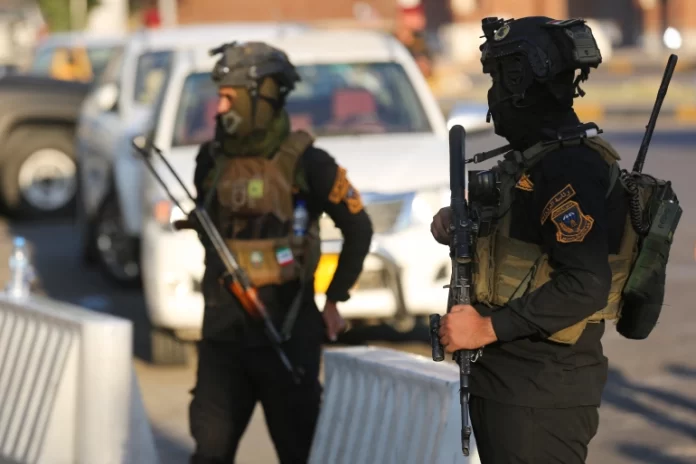
Protesters near Baghdad’s Green Zone still dispute election results days after a failed assassination attempt on Mustafa al–Kadhimi.
Iraqi protesters who reject the results of the recent parliamentary elections have been holding sit-ins near the high-security Green Zone as an uneasy calm begins to settle in Baghdad after a failed attempt to assassinate Prime Minister Mustafa al-Kadhimi early on Sunday morning.
“We don’t accept the election results and we don’t accept the blame,” Khalid, a protester sitting in front of a makeshift tent near the iconic al-Jumhuriya Bridge, told Al Jazeera. “We won’t leave until they give us what we deserve.”
Khalid is one of a few hundred protesters who are mostly supporters of pro-Iran political blocs that suffered big losses in the October election. They claimed that the election was rigged.
The same group of protesters are also now denying their involvement with the drone attack that hit the Iraqi prime minister’s residence in the Green Zone.
After an eventful weekend when deadly clashes between the protesters and the security forces broke out on Friday that killed three and injured more than a hundred people and the drone attack that happened on Sunday, the Iraqi capital is now on tenterhooks as different parties undertake the process of forming the government cautiously.
Until now, no group has claimed responsibility for the attack.
Media reports, citing security sources and government officials, say that at least one Iran-backed militia was responsible for the attack, which many analysts say, bears the hallmarks of the militia groups who have rejected the election results and threatened to resort to force.
‘Crossed the red line’
The night before the attack, Qais Khazali, the leader of the Asa’ib Ahl al-Haq, an Iran-backed militia group, was seen standing among the protesters and threatening the prime minister. “The martyrs’ blood will be your blood,” Khazali said, referring to the protesters that were killed during the clashes with the security forces.
Yet during an interview with Al Jazeera on Tuesday, Khazali staunchly rejected the claim that his group was behind the attack.
“To be honest, we are leaning towards the hypothesis that a third party was behind the attack with Israeli implementation and American coordination,” Khazili said. He also said that he would not accept the election results and threatened to “boycott the political process”.
Esmail Qaani, the commander of the Quds Force who succeeded Iranian top General Qassem Soleimani after his assassination by the US, soon visited Baghdad and met with militia groups in an effort to mediate and de-escalate the tension.
Qaani exclaimed in a meeting with militia groups that “what happened crossed the red line and Tehran cannot accept this,” according to UK-based website, Amwaj.media.
The streets of Baghdad have been significantly quieter this week compared with the days before, especially at night, as the Iraqi army has deployed armoured vehicles to various parts of the city at night amid the tension. “We are letting Iraqi people know that they are safe and protected,” one security official said.
For Iraqis who have seen the turmoil unfolding in the past few days, however, it is difficult to feel safe as relations between the state and the militia groups are fraught, and even among the Shia militia groups themselves.
“Welcome to Iraq, one minute you might think we could finally have a break, the next we’re scrambling to find shelter in crossfires,” Salam al-Halali, a Baghdad resident, told Al Jazeera.
Some analysts, however, believe the escalation might have reached its peak and what follows is a relatively more peaceful, albeit painstaking, political negotiation process as pro-Iran groups’ political blocs strive to make sure they will not be excluded from the next government.
Soon after the election results were announced, an ad-hoc group named “Coordinate Framework,” consisting of Shia groups that rejected the election results on the unsubstantiated claims of election fraud, was formed.
It has since then been pushing for manual recounting of the votes after some of them suffered devastating losses in the latest election. The political arm of the Hashd al-Shaabi, a pro-Iranian bloc, saw its seats reduced by more than three times. It was the second-largest bloc in previous parliament with 48 seats.
Moqtada al-Sadr, a prominent Shia scholar, won the lion’s share of seats in the incoming parliament, and is edging to form a majority government – a move that has angered other groups that have traditionally been parts of a coalition government.
His party emerged the largest group winning 73 seats in the 329-member parliament.




